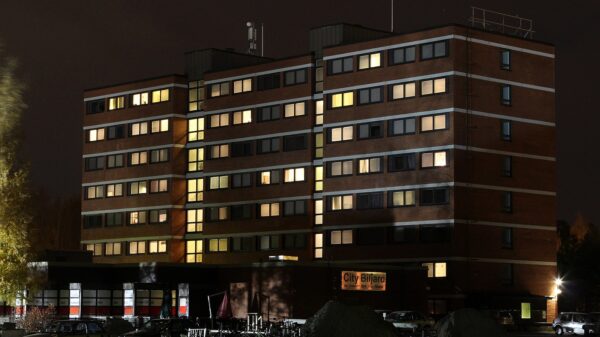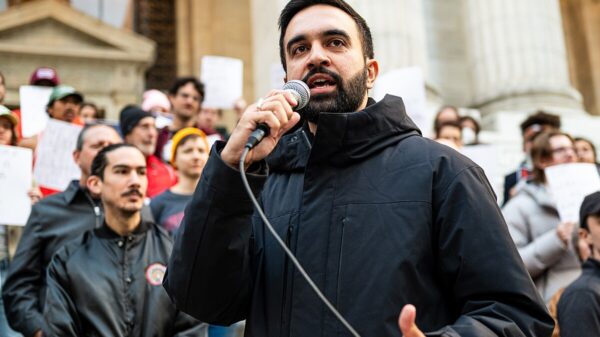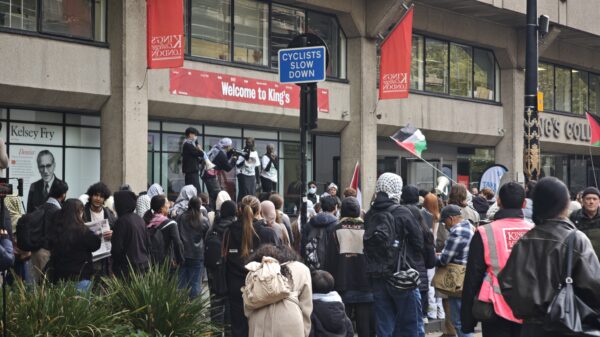Staff writer Roxy-Moon Dahal Hodson talks to Transgender students at KCL following the recent UK Supreme Court ruling on the legal definition of a woman under the Equality Act 2010.
Only a few miles away from King’s Stand Campus, the UK Supreme Court has recently ruled that the legal definition of a woman, in the context of the Equality Act 2010, is reliant upon their biological sex. This decision has sent shockwaves throughout the UK and impacted our King’s community. This has prompted Transgender students to speak out on the recent ruling to Roar News.
“So, what is King’s going to change?” is the prevailing question posed by Celia, a second-year BA Classics student at King’s College London who, alongside fellow transgender students, believes the recent UK Supreme Court ruling will infringe on their campus experience.
The court clarified the legal definition of ‘woman’ under the Equality Act 2010, which refers to biological sex, regardless of Gender Recognition Certificates (GRCs). This means that transgender women can be legally denied access to single-sex spaces.
King’s College London released an open statement to students eight days after the ruling on their website, claiming they “do not have all the answers.” Despite their obscure response, they elaborated on their support for trans students of the university, “King’s is and will always be a welcoming, inclusive and supportive place for everyone in our community.” Other universities including University College London, University of York and more, offered similar statements of support yet none outlined what the outcome of the ruling will look like on campuses.
With no clear direction, transgender students have been left in the dark. There are valid concerns about the university’s indecision – their ‘Equality, Diversity & Inclusion (EDI) strategy’ references the university’s “responsibilities” to the Equality Act 2010. They offer further information on their ‘Trans, Gender Identity and Gender Expression Guidance for Staff and Students‘ using the Equality Act 2010 again, which provides a legal framework to their guidance. It has not been updated post-ruling.
Transgender students reactions to the recent ruling
Roar reached out to ask transgender students at King’s College London about the recent ruling and how they feel it will impact them, both on and off campus.
In 2024, reported transgender hate crimes fell by 2% in the UK; however Celia opened up about how the ruling may “embolden really prevalent hateful and violent behaviour” even further. On her own experiences since transitioning, she said:
“I myself have had a lot of close calls with violence or sexual harassment, something that never happened to me before transitioning. With the protective guardrails being stripped away, it’s really concerning.”
Celia
When asked about whether the ruling is going to hinder her student life she revealed:
“I think it definitely will hold myself and others from actively participating in student life because you’re so afraid to make a ‘mistake’ – it could have such grave consequences. The ruling has already been used by the British Transport Police to mandate male officers searching trans women – so what is King’s going to change?”
Celia
The Times reported that the British Transport Police (BTP) has ‘rolled back’ on their decision. Information divulged to officers stated, “If any individual objects to being searched by any officer […] we will make every effort to ensure the officer is replaced by a member of the team that the individual is most comfortable with to conduct the search in their place.” They made sure to clarify that this is the case with anyone, not only transgender people.
Alice, a fourth-year MSci Mathematics student speaks on single-sex spaces, told Roar that:
“[Before the ruling] I felt like I didn’t belong in a lot of women’s spaces because I’d already been avoiding women’s toilets – this has further amplified that. But men’s spaces make me feel very unsafe and lead to a lot of weird looks. I’m trying to avoid gendered spaces in general which is challenging. The Maughan Library [on campus] only has gendered and disabled toilets. I feel guilty using the disabled toilets as I don’t have a disability.”
Alice
Concerned about the consequences of the ruling in the future, Alice expressed:
“A few days before the ruling, NHS England said they were preventing trans healthcare for under 18s through shared care agreements, and that for over 18s, it would be reviewed in the next year. [It is] really stressful that I may lose access to healthcare. This has all added a ton of stress on my life [alongside the] upcoming exams. It has led me to start considering doing a PhD abroad rather than in the UK as I intended. The ruling also said that trans people are still protected under the law from discrimination – I cannot see how this ruling and that statement can both remain true in the long run.”
Alice
Skylar, a first-year MSci Physics with Theoretical Physics student, feels the ruling has “severely affected my ability to revise for my exams and has had a massive impact on my mental health. I’m terrified of what might come next—not just in terms of national anti-trans policies, but also whether my own university might feel pressured to follow suit.”
She defends transgender women labelled as dangerous, “There is no evidence that trans women are a danger in women’s spaces, yet we’re treated as if our existence is inherently threatening. This kind of rhetoric doesn’t stay online, it manifests in real-world violence, harassment and exclusion. More trans women will be put in danger because of this. This isn’t just an attack on trans women; it’s a threat to all women. It opens the door to questioning and policing any woman who doesn’t conform to narrow ideas of gender. We need allies to stand up now, because this won’t stop with just trans people losing our rights.”
The wider implications of the ruling
Critics of the ruling claim that it also complicates everyday life for cisgender women who do not present as feminine. Labour MP Dawn Butler believes this ruling will impact “butch lesbians” as well as other cisgender women. She goes on to argue:
“If you’re saying that trans women have to use men’s toilets, trans men then have to use women’s toilets. How are you going to stop them? By asking to see their genitalia? It makes no sense.’”
Dawn Butler, Labour MP for Brent Central and Brent South
An anonymous master’s student highlights how the Supreme Court ruling is not the only concern for transgender people: “It is incredibly important that allies show up for trans women, not just to fight against the Supreme Court ruling, but also for better healthcare, housing, and support.”
They believe that gender critical movements are not interested in protecting women’s rights but rather, “ push[ing] trans women out of society. Trans women in particular are likely to face even more hostility than they already experience [since the ruling].”
The Blackpool Lead spoke on what the real dangers are for all women and how focusing on transgender people distracts from cisgender male violence:
“Many only seem to care about using women’s rights as a rhetorical weapon, so long as it targets trans people or immigrants […] Cisgender men overwhelmingly commit violence against women and girls. […] Trans people are far more likely to be victims of violence than perpetrators. The spectre of the predatory man “posing” as a woman to infiltrate women’s spaces is vanishingly rare.”
The Blackpool Lead
An anonymous second-year student spoke on their experience interacting with cisgender classmates regarding the recent ruling:
“As a trans student, it infuriates me seeing my cis classmates go on with their lives without acknowledging the Supreme Court’s ruling. I don’t know anyone in my course who has been as outspoken as I have been and it makes me feel like nobody cares. Trans people all around the country are going to die because of this ruling. Every trans woman I have ever met is generous and completely non-threatening, and I have watched as this news has torn them apart.”
Anonymous student
They go on to discuss how allies should try to make real change for the community, rather than quoting tagline statements:
“It isn’t enough to say ‘trans women are women’, because we know. If you want to make a change, you have to put real intent into it and show that you actually care. I am trans and haven’t socially transitioned completely yet, but I’m scared. I would feel unmoored if it weren’t for the marvelous trans community I have found in London. Being transgender is beautiful and it shouldn’t be something you feel strange speaking out in support of.”
Anonymous student
The impact on King’s community and KCL’s response
Transgender students at KCL expressed how the ruling has escalated fears surrounding their mental wellbeing, safety, and sense of identity.
Many universities and student unions invest in support networks and policies that support LGBTQ+ staff and students. King’s College London offers a LGBTQ+ Staff Network named Proudly King’s, celebrates LGBTQ+ history at the university, and adopts a variety of schemes to ensure diversity and inclusion. However, this ruling challenges the university on whether they truly stand with a movement they claim to support.
Roar News contacted the university for further clarification on their statement. A King’s College London Spokesperson said:
“We know that this may be a time of uncertainty and anxiety for some members of our community and we want to assure everyone that King’s is and will always be a welcoming, inclusive and supportive place, and to remind students and staff that wellbeing support is available through the usual channels if needed. Whilst it is not clear at this moment what the recent ruling by the UK Supreme Court will mean for the daily functioning of organizations like ours, we are working along with other universities to understand the implications of the ruling and how the University can respond to it. Given the breadth of the ruling this may take some time, but we will keep our community posted as our position evolves.”
A Spokesperson for King’s College London
Unless King’s College London decides to announce their position on the ruling prior to the start of the next academic year, concerns of the university’s present vague stance will continue.
I am an English student at King’s College London originally from the Valleys in South Wales. I write culture, comment and feature pieces for Roar News and Strand Magazine. I am dedicated to dissecting cultural and political issues of our time.














